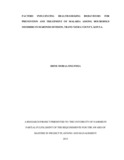| dc.description.abstract | Malaria is one of the common parasitic diseases in the world and the common cause of
morbidity and mortality to human beings, especially young persons. Large amounts of
resources have been invested in its control and treatment; however it still remains a major
problem to public health. Despite all the efforts that have gone towards trying to eradicate
malaria, it is still considered a killer disease. The purpose of the study was to determine
the factors influencing health – seeking behaviours for prevention and treatment of
malaria among household members in Mabonde location, Trans Nzoia County, Kenya.
The study was guided by the following objectives; to investigate the knowledge base of
the people about malaria on the health – seeking behaviours for prevention and treatment
of malaria; to identify the perceptions of malaria on the health – seeking behaviours for
prevention and treatment of malaria; to determine the influence of infrastructure on the
health – seeking behaviours for prevention and treatment of malaria and to examine the
influence of socio- economic status on the health – seeking behaviours for prevention and
treatment of malaria. Literature review helped to compare the findings of other scholars
in different part of the globe on the same topic. In chapter three the study utilized a
descriptive survey design, and, the target population comprised of the 540 households
and Using the Krejcie and Morgan table of determining sample size (Krejcie and Morgan,
1970) a total sample of 247 respondents was obtained for the study. From this sample
probability to proportion size was used to come up with the number of each respondent in
each stratum. The questionnaires were used for the purpose of data collection as the data
to be collected is quantitative. A pilot study was done in Kiminini division which was
neibouring Waitaluk division and , reliability was achieved by doing test re-test on the
study sample in the pilot study data were analyzed using statistical methods and
expressed in the form of tables, frequencies and percentages. All ethical considerations
were adhered to in the study. The findings revealed that; although the respondents had
good knowledge about malaria, they were influence by negative perceptions,
infrastructure and low socio economic status. The researcher recommended the
following: more training on malaria ought to be done to enable many people in the area to
have a sound knowledge base that would enable them to make adequate health seeking
behaviours. The county government should work towards improving the road network for
ease of access to the health facilities. It should also provide health facilities within reach
of the community to enhance the health seeking behaviours of the community. The
personnel at the health facilities should also be trained on customer relations. The
community should be trained and advised to engage more in income generating activities
to help them afford medical care. They should also be advised .on the importance of
joining healthcare systems such as NHIF for cheaper health care services. | en_US |

